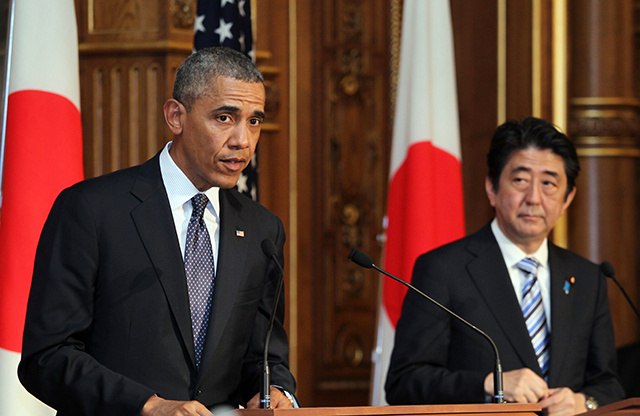During his trip to Japan, President Obama publicly affirmed long-standing U.S. policy that the bilateral security treaty applies to the Japanese-controlled Senkaku Islands. China claims sovereignty over the islands and, in recent years, has tried to intimidate Japan—much as Beijing has bullied the Philippines in pursuit of its extralegal territorial claims in the South China Sea.
President Obama’s statement was a welcome and proper confirmation of U.S. support for a critical Pacific ally.
During a joint press conference with Japanese Prime Minister Shinzo Abe, Obama declared, “let me reiterate that our treaty commitment to Japan’s security is absolute, and Article 5 [of the bilateral security treaty] covers all territories under Japan’s administration, including the Senkaku Islands.”
While this was the first time Obama publicly affirmed the parameters of the U.S. defense commitment to Japan, it is consistent with the long-standing policies of his predecessors. As Obama pointed out, “this isn’t a ‘red line’ that I’m drawing; it is the standard interpretation over multiple administrations of the terms of the alliance…There’s no shift in position. There’s no “red line” that’s been drawn. We’re simply applying the treaty.”
In 2004, Deputy Secretary of State Richard Armitage stated that the U.S.-Japan Mutual Security Treaty “would require any attack on Japan, or the administrative territories under Japanese control, to be seen as an attack on the United States.”
During a 2010 flare-up of tensions between China and Japan over the Senkakus, U.S. Secretary of State Hillary Clinton stated, “we have made it very clear that the [Senkaku] islands are part of our mutual treaty obligations, and the obligation to defend Japan
The Obama administration’s public reassurance to Japan is meant to deter China from behaving aggressively. In recent years, Beijing has used military and economic threats, bombastic language, and enforcement through military bullying to extend its extra-legal claims of sovereignty in the East and South China Seas.
In November 2013, China declared an Air Defense Identification Zone (ADIZ) over the East China Sea, including the Senkaku Islands. Beijing threatened to use its military to enforce the ADIZ. Washington condemned this declaration as a provocative act that exacerbated tensions in the region and increased the risks of a military clash.
Beijing is also attempting to divert attention from its own actions by mischaracterizing Japan as a threat to regional security. China’s bellicose actions have fueled regional concern and triggered a greater Japanese willingness confront Chinese expansionism and strengthen its military. This willingness to defend its territory has been mischaracterized as a resurgence of Japan’s 1930s imperial militarism.
Washington should continue to support Abe’s efforts to implement long overdue defense reforms, such as implementing collective self-defense, and the assumption of a larger regional and global security role commensurate with Japan’s size and capabilities.
Whether the Obama administration will maintain a firm stance against China’s sovereignty claims remains to be seen. But for the policy to be effective, a principled message of affirming U.S. support for international law and defending our allies must be backed by resolute U.S. actions, including reversing dangerous defense budget cuts, maintaining a robust forward-deployed U.S. military presence, strengthening and modernizing our alliances, and standing up to Chinese use of intimidation, coercion or force to assert a territorial claim.































